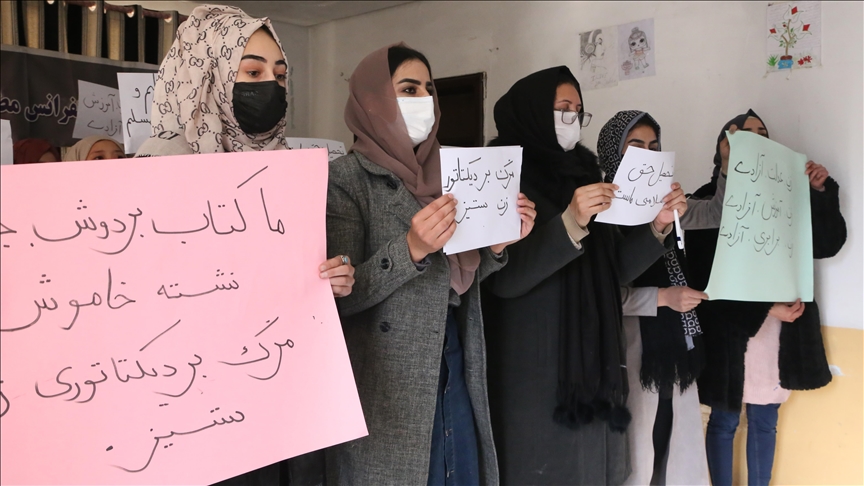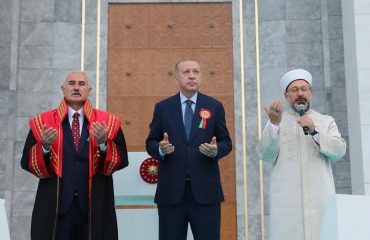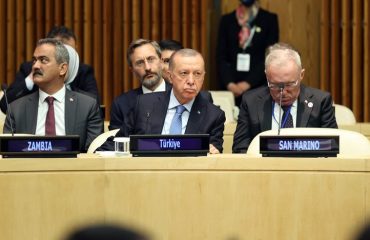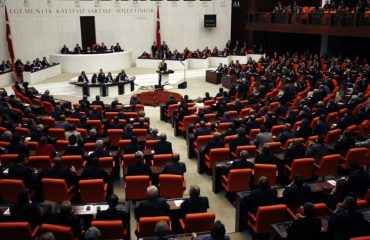

Turkish women’s rights platform EŞİK appealed to the United Nations’ (UN) Special Coordinator Feridun Sinirlioğlu, leading the preparation of an independent report on Afghanistan, with a letter, emphasising Afghan women’s rights.
While the Taliban celebrated its second year of regaining power on August 15 after the withdrawal of US-led forces, Turkish women’s rights associations appealed to the United Nations’ Special Coordinator leading the preparation of an independent report on Afghanistan with a letter, emphasising Afghan women’s rights.
“As women in Turkey, where the basic principles of equality and secularism are up for discussion, we expect and demand that you meet with Afghan women’s rights and all human rights defenders in Afghanistan and in the diaspora and include their views and living conditions in your report, in the name of solidarity with Afghan women, in the name of the lives, rights, and dreams of all of us,” the Women’s Platform for Equality, EŞİK, stated in their letter to Feridun Sinirlioğlu, Permanent Representative of Türkiye to the UN.
EŞİK consists of more than 340 women’s rights and LGBTI rights associations, which formed an umbrella platform to address gender equality issues in Türkiye and around the world.
UN Representative as the Special Coordinator
Sending a letter to Sinirlioğlu, who was appointed as UN Secretary General Antonio Guterres’ Special Coordinator for Independent Assessment Mandated by Security Council Resolution, EŞİK asked for the UN to address Afghan women’s rights in their report.
Sinirlioğlu is to lead an independent assessment with a view to providing recommendations to address the current challenges faced by Afghanistan. The report to be prepared is due to be completed in November of this year.
“The Taliban’s political vision threatens peace and security not only in Afghanistan but also in the entire region and globally. Therefore, in your report, we urge you to call on all UN member states to adopt resolutions prohibiting direct or indirect aid to perpetuate the gender discriminatory Taliban regime. We look forward to the recommendations in your report,” EŞİK stated in their letter to Sinirlioğlu.
The Special Coordinator stated to YetkinReport that he had received the letter and “read it thoroughly.”
“It is within the UN guidelines. I will take it into consideration. Since I am responsible for writing the report, I cannot comment further,” Sinirlioğlu said.
Taliban rule depreciates women’s rights
Two years ago, on August 15, 2021, the Taliban regained power after the withdrawal of US-led forces from Afghanistan after a 20-year hiatus. Appealing to the international public, they announced that they would respect women’s rights, unlike their rule between 1996 and 2001.
However, within the first months of their rule reinstating Sharia, they banned girls over the age of 12 from attending classes. Then female staff were banned from working in aid organisations; women were banned from entering parks; and finally, they were restricted from travelling without a male guardian. Nevertheless, the Taliban believe that they can be officially recognised internationally.
This discriminatory practise of the second Taliban regime, which is not yet officially recognised by any country in the world, is a major obstacle to their hope of recognition. It is also a major reason for continued international sanctions and embargoes.
Nevertheless, the Taliban believe that they can make progress towards recognition while violating women’s rights.
According to Reuters, “the corruption that exploded as Western money poured in for years after the Taliban were ousted in 2001, has been reduced. And have significantly reduced poppy production in what for years was the world’s largest source of opium.”
“The Taliban will be hoping the progress will help bring foreign recognition, the lifting of sanctions, and the release of about $7 billion in central bank assets frozen in the U.S. Federal Reserve Bank of New York in 2021, half of which was later transferred to a Swiss trust.”


